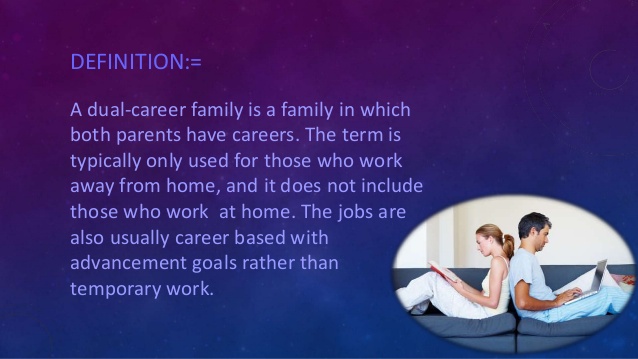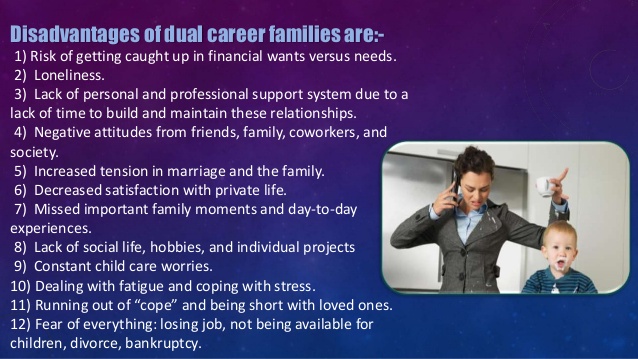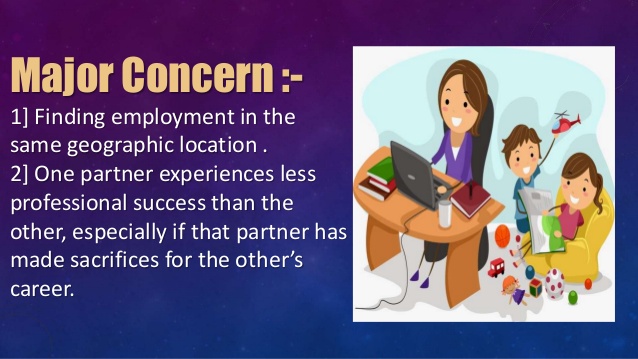DUAL CAREER HOUSEHOLDS: NATURE OF PROBLEMS AND CONSEQUENCES
Relevance: Sociology: Systems of Kinship in India; Family and marriage in India;Patriarchy, entitlements and sexual division of labour; Social Changes in India; & G.S paper I: Society and social Issues.
Dual career households have both positive and negative dimensions.
The fact that both the spouses go out to earn a living results in many adjustments in behaviour patterns among the members of the families, especially in terms of duties and responsibilities. Changes are also noticed in social interaction and in the way of life of the members of the dual career households.
The following discussion analyzes the problems and consequences faced by the dual career households o f the city.
Advantages
The most positive effect of a dual career marriage, as stated by the dual career respondents of Guwahati City is the double income and its added benefits.
The advantages of the surveyed dual career households are as follows:
- The double income that a dual career couple earns helps in affording a better lifestyle.
- A dual career couple has to complete a number of tasks within a limited amount of time. Therefore, they strive to get out the maximum amount of work done as possible within the limited amount of time.
- Dual career couples are usually independent due to better financial conditions than single earner couples.
- Dual career couples get the chance to utilize their educational qualifications and talents.
- A job provides a feeling of security. It boosts the confidence of the employee and allows the person to take risks, to accomplish goals and to move up in life.
- Moreover, some jobs also provide monetary compensation in case of illnesses of the employees and their dependents. Dual career couples also have greater potential for retirement funds.
Disadvantages
- Lack of time is one of the biggest disadvantages of dual career households. Dual career couples have to complete many tasks in a day. As such, they have less freedom with time.
- Many dual career couples suffer from work overload which leads to role conflict. Work overload and role conflict are especially applicable in case of female spouses as they are more involved in looking after the homes and children besides their economic roles when compared to the male spouses.
- Dual career couples may face the problem of giving too much importance to their careers at the expense of their relationships.
- Looking after children during the absence of the parents from home is a great responsibility. Dual career couples with children suffer from childcare worries.
- Children of dual career couples are sometimes forced to do more tasks as their parents stay away from their homes during the day.
- Many dual career couples feel stressed out and suffer from physical and mental exhaustion at the end of the day after completing a multitude of 206 tasks.
- Most societies still think that a women’s primary duty is to look after her home. Her economic role is treated as secondary. Not only males, but also working women hold this view.
- Some also fear the collapse of their marriage as in some couples the feeling of suspicion of infidelity arises from time to time. According to some respondents, husbands want their wives to be in the teaching and other ‘feminine’ professions so that they can spare enough time for their families.
The problems that dual career couples face differ from couple to couple. Problems may be environmental – depending on the work and home environment, social – depending on the social status of dual career couples and psychological – depending on the state of mind (Kapoor, 1970).
- Problems of Dual C areer Couples belonging to Low-Income Category
The problems of the dual career couples belonging to low-income category as found out from the study are mainly children-related.
- Problems of Middle-Income Category
Dual Career Couples Problems experienced by the middle-income category dual career respondents are similar to those experienced by the low-income category dual career. Other problems as stated by the middle-income category dual career couples are that they cannot take proper care of their homes, they have less time and energy for other work, unequal sharing of housework by spouses, less time for each other, less time for hobbies, feeling tired at the end of the day and wanting to stay at home sometimes.
- Problems of High-Income Category
Similar to those of middle-income category dual career couples as found out from the study. But in addition to these problems, they also face some additional problems as stated below. Since high-income category dual career couples usually have to work for longer hours and undertake greater responsibilities, they lead very busy lives and have less time for personal life. They suffer from tension due to lack of time and have no time to relax.
Consequences of Dual Career Households
- The rising number of dual career households in the city has altered the way of living of a growing section of population in the society.
- The most important modification brought about by dual career households is in the relationship between individual decisions and cultural norms about men’s and women’s roles.
- Dual career couples have transformed the social landscape in that there are ‘two husbands and no wife’. Both parents are absent from the home during the day and each struggles to balance career objectives while maintaining a family.
Numerous challenges confront dual career families. These include:
(a) Balancing career and familial responsibilities,
(b) Attempting to provide mutual support while at the same time managing competitive feelings,
(c) Dealing with a finite amount of time in the light of multiple role demands, and
(d) Preserving one’s identity as a ‘person’ as distinct from ‘spouse’. The modem family is struggling through a modifying role definition. Ambiguity exists concerning ownership of responsibilities and prioritization of tasks.
(i) Domestic Consequences
The rise of dual career couples is responsible for bringing out modifications in domestic roles and responsibilities of the members of the families in the city. As both the spouses are engaged in economic activities, time available for domestic work
(ii) Social Consequences
The rise of the dual career family has led to changes in the social roles performed by the members of the family. Dual career households have led to the rise in the number of nuclear families, as dual career couples do not have time to cater to the needs of joint families. Other consequences include residing in a place that is favourable from the location point of view in terms of accessibility, mixing with people coming from different socio-economic backgrounds, and as a result broadening their outlook on life. Female spouses play active roles in decision-making.
(iii) Economic Consequences
Both the husband and wife of a dual career family are economically benefited. Dual career households are plagued by less financial worries than single income families. They are better protected against financial problems in the event of a job loss.
(iv) Occupational Consequences
The dual career family has led to more females seeking jobs as they are now no longer satisfied to remain at home to look after household tasks. This has led to the utilization of human resources, as more people are able to utilize their educational qualifications and talents. One of the important occupational consequences is the spatial constraint of dual career couples. It is found the husband’s career is more primary than the wife’s.
(v) Emotional/Psvchological Consequences
Dual career households are also in a way responsible for the rise in the individualistic attitude as the spouses try to fulfil their career aspirations and raise their standards of living, as already stated. As dual career couples have less time to spend with their children, their children become more self-reliant and grow up to be responsible citizens of the society. On the contrary, children sometimes feel neglected and may suffer from emotional insecurity, which may also retard their physical growth if there are no alternative arrangements to look after their physical and emotional needs.
For more such notes, Articles, News & Views Join our Telegram Channel.
Click the link below to see the details about the UPSC –Civils courses offered by Triumph IAS. https://triumphias.com/pages-all-courses.php





